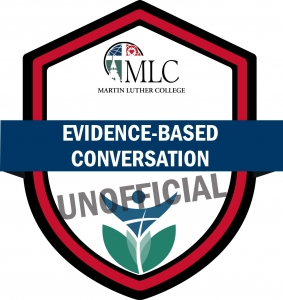MICRO-CREDENTIALS
Formal Recognition for Informal Learning
BGD0121 Evidence-Based Conversation
DESCRIPTION: Instructional supervisors who earn the Evidence-Based Conversation Micro-Credential provide timely and effective observation feedback based on observable data while avoiding judgments and opinions.
EARNING THE MICRO-CREDENTIAL: To earn the Evidence-Based Conversation Micro-Credential, instructional supervisors demonstrate that they can use evidence-based data from a classroom visit to help teachers reflect on their teaching practice and set goals. The earner will submit the classroom observation data-collecting tool and the video-recorded conversation with the teacher based on the same observation. The video will demonstrate the coach using the teacher’s own interpretation of the data to serve as the basis for reflection and goal setting.
RESEARCH BASE: Effective feedback from instructional coaches is specific, positive, timely, and corrective when necessary, and it improves teacher practice and learner outcomes (Cornelius & Nagro, 2014; Scheeler, Ruhl, & McAfee, 2004; Solomon, Klein, & Politylo, 2012; Stormont, Reinke, Newcomer, Marchese, & Lewis, 2015; as cited in Pierce & Buysee, 2016).
Pierce, J. D. & Buysee, V. (2016) Effective coaching: Improving teacher practice and outcomes for all learners. NCSI Effective Coaching Brief. NCSI. Retrieved from https://ncsi-library.wested.org/resources/57
BACKGROUND: An effective instructional supervisor helps teachers improve through evidence-based coaching rather than evaluative conversations. The supervisor follows up on a classroom observation by using the evidence to help the teacher reflect on practice, set a goal, and create accountability for next steps.
The following are useful tools to learn more about the topic:
- Handout: Facts vs Opinions
- Article: Every Teacher Needs a Coach
- Video: The Language of Coaching
MICRO-CREDENTIAL CRITERIA: An evidence-based conversation micro-credential earner can do the following:
- Share observable data rather than judgments or interpretations of the data.
- Encourage teacher-generated interpretations of the data.
- Help the teacher set evidence-based goals.
SKILL DEMONSTRATION:
- Submit a completed data-collection tool of a specific classroom visit.
The data-collection tool should include the following:- The grade level, date, and time of the observation.
- Fact-based evidence of teaching and learning.
- Submit a video of the evidence-based conversation.
Keep in mind the following:- The conversation should align with the uploaded data-collection tool.
- The video provides evidence of the coach and teacher using data from the tool.
- The teacher uses the evidence or data to reflect and set goals.
RUBRIC:
RESOURCES:
Books
Lipton, L. & Wellman, B. (2013) Learning-focused supervision: Developing professional expertise in standards-driven systems. Chapters 3 & 4. Charlotte VT: MiraVia.
Articles
Wiggins, G. (2012) Seven keys to effective feedback. Educational Leadership, 70(1), 10-16. Retrieved from http://www.ascd.org/publications/educational-leadership/sept12/vol70/num01/Seven-Keys-to-Effective-Feedback.aspx
Hall, P. (2019) The instructional leader’s most difficult job. Educational Leadership, 76(6), 12-17. Retrieved from http://www.ascd.org/publications/educational-leadership/mar19/vol76/num06/The-Instructional-Leader’s-Most-Difficult-Job.aspx
Learning Forward (n.d.) Feedback fundamentals: Chapter one. Retrieved from https://learningforward.org/docs/default-source/chapter-preview/feedback-chapter-1.pdf?_ga=2.220460696.1859534443.1570029266-640541458.1570029266
Finley, T.B. (n.d.) Feedback strategies for coaches and administrators. Insight Advance. Retrieved from https://eleducation.org/resources/coaching-for-change-giving-feedback
Missouri Department of Elementary and Secondary Education (n.d.) Providing meaningful feedback. Retrieved from https://dese.mo.gov/sites/default/files/MeaningfulFeedback-June2013.pdf
Videos
WELS Ministerial Growth and Evaluation Program: Three Coaching Conversations. https://vimeo.com/363913894
Qualities of Effective Feedback: https://youtu.be/RybeJ_wzu04
Preparing evidence-based feedback (password = Growth): https://vimeo.com/289604309 beginning at 18:55
Preparing evidence-based feedback (password = Growth): https://vimeo.com/292366212 from start to 3:00 minutes.
Martin Luther College Courses
EDU5304 Supervision of Instruction – 3 credits (graduate level)




